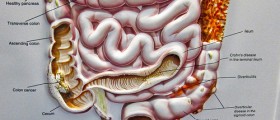Chronic diarrhea, being a persistent occurrence or recurrence of watery or loose stool, bothering a person for more than four weeks is a condition that can be triggered by numerous different factors. Some causes may be dangerous or even life-threatening while others may be easily treatable. Therefore, it is important to have the cause behind your chronic diarrhea diagnosed and dealt with instead of letting it bother you or, let alone, get worse.
Causes of Chronic Diarrhea
Irritable bowel syndrome is a disease that commonly leads to diarrhea and possibly constipation. It is caused by the rapid passage of intestinal contents through the colon.

Alternatively, this condition may be triggered by infections affecting the digestive system. Chronic diarrhea can be caused by giardia lamblia or even AIDS. Having your digestive system overpopulated by different bacteria may easily lead to chronic diarrhea too, especially if this phenomenon affects your small intestine, spreading there from the colon and disallowing food to be digested properly.
Sometimes, bacterial, viral, or parasitic infections may lead to chronic diarrhea once they pass. Inflammatory bowel disease is yet another possible trigger of chronic diarrhea, along with Crohn's disease, ulcerative colitis, or inflammation of the small intestine or the colon.
The Worst Case Scenarios
Constipation and diarrhea may be provoked by colon cancer where cancer itself blocks the stool and prevents it from passing. Yet, the watery content of the stool may pass, leading to diarrhea and thin stool. Rectal cancer may lead to a feeling that your stool has not passed completely. Nevertheless, all these problems may be a sign of severe constipation, which is a problem capable of being treated more easily.
Additionally, one's inability to absorb sugars can lead to chronic constipation too, especially in cases of lactose intolerance where the enzymes which are required to complete the digestion processes of milk are absent. Also, a person may not be capable of digesting fat properly due to pancreatic or intestinal problems. Then, undigested fat enters the small intestine leading to an increased expelling of water, resulting in diarrhea.
Other Serious Causes of Chronic Diarrhea
Finally, certain endocrine diseases may lead to chronic diarrhea as well. Hyperthyroidism and under-active pituitary and adrenal glands lead to this health problem. Overuse of laxatives can easily cause diarrhea which can be chronic in some cases.
All in all, there is a wide variety of possible causes when it comes to chronic diarrhea. Therefore, it is important to react timely and have your diarrhea properly treated. However, this can only be done after having the causes behind it properly diagnosed.
- Chronic diarrhea may be divided into three basic categories: watery, fatty (malabsorption), and inflammatory (with blood and pus). However, not all chronic diarrhea is strictly watery, malabsorptive, or inflammatory, because some categories overlap.
- Physical examination provides additional clues to the cause of diarrhea. Recent weight loss or lymphadenopathy could result from chronic infection or malignancy. Eye findings, such as episcleritis or exophthalmia, suggest that the diarrhea is attributable to inflammatory bowel disease (IBD) and hyperthyroidism, respectively. Dermatitis herpetiformis, an itchy blistering rash, is found in 15 to 25 percent of patients with celiac disease.
- An abdominal examination for scars (surgical causes of diarrhea), bowel sounds (hypermotility), tenderness (infection and inflammation), and masses (neoplasia) should be followed by rectal examination, including fecal occult blood testing. Anal fistulae suggest Crohn disease. A quick office anoscopy may detect ulcerations or impacted stool.
- Irritable bowel syndrome (IBS) is the most common cause of functional diarrhea in the developed world. IBS is a symptom complex of crampy abdominal pain accompanied by altered bowel habits, either with diarrhea or constipation. Usually watery diarrhea occurs while awake, often following meals.
- Early ulcerative colitis, distal colitis, and proctitis result in episodes of rectal bleeding, diarrhea, pain, and tenesmus. Moderate (left-sided) and severe (extensive) colitis are associated with bloody diarrhea, weight loss, fever, and anemia.
- Endocrine causes of chronic secretory diarrhea include Addison disease, carcinoid tumors, vipoma, gastrinoma (Zollinger-Ellison syndrome), and mastocytosis. Hyperthyroidism increases motility. Serum peptide concentrations (e.g., gastrin, calcitonin, vasoactive intestinal peptide) and urinary histamine level should be obtained only when these conditions are suspected. Neoplastic diarrhea is associated with colon carcinoma, villous adenocarcinoma, and lymphoma.
- www.nhs.uk/conditions/bowel-cancer/symptoms/
- www.nhs.uk/conditions/bowel-cancer/
- Photo courtesy of BruceBlaus by Wikimedia Commons: commons.wikimedia.org/wiki/File:Blausen_0246_ColorectalCancer.png









_f_280x120.jpg)







Your thoughts on this
Loading...